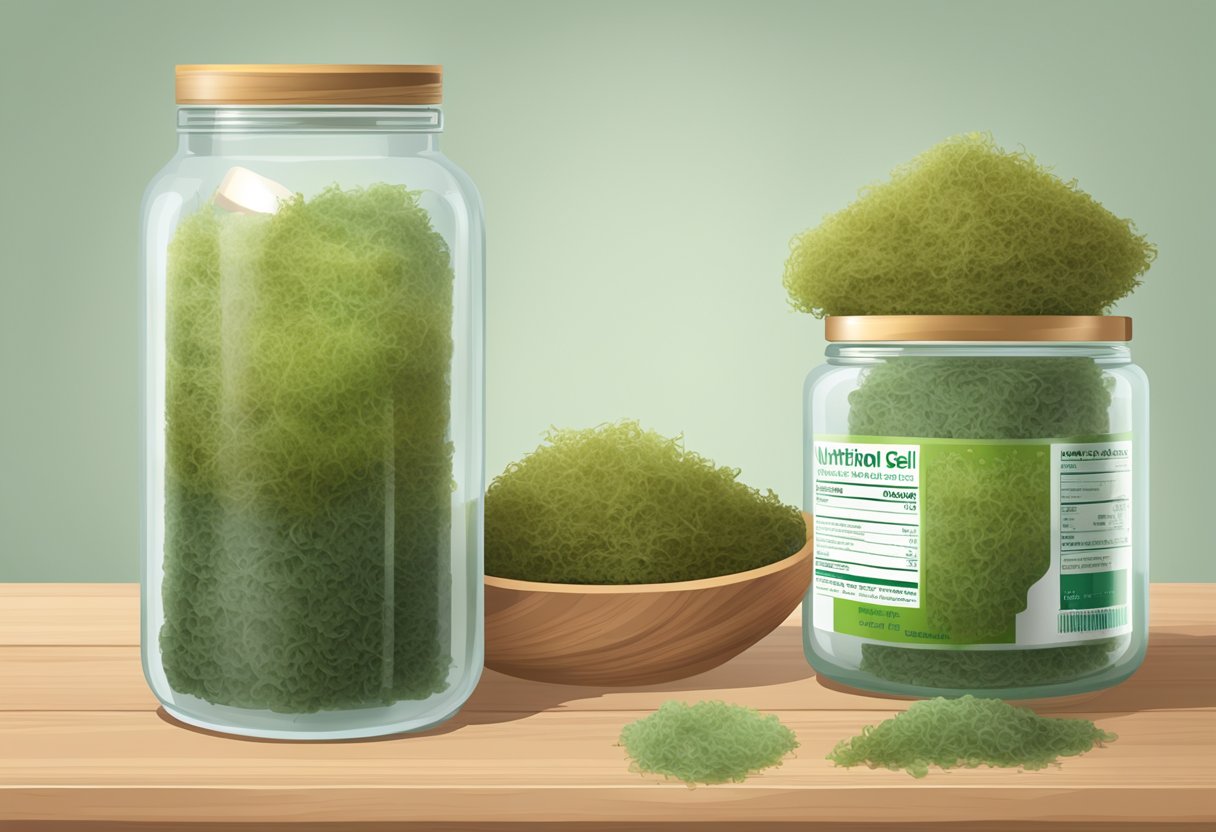Sea moss has recently gained popularity as a superfood, with claims ranging from boosting immunity to improving digestion. Despite its rapid rise to fame, many consumers remain skeptical about its purported health benefits and question its legitimacy. It is essential to analyze both scientific research and nutritional content to assess the validity of these claims.
Nutritionally, sea moss is rich in vitamins and minerals, particularly iodine, which is crucial for thyroid function, as well as potassium, calcium, and magnesium. The algae also contain carrageenan, a substance used as a thickener in the food industry, which has its own set of health considerations. While the nutrient profile of sea moss is impressive, it is important to discern whether the concentration of these nutrients can significantly impact human health when consumed in typical dietary amounts.
Authoritative content from health professionals and research studies suggests that while sea moss can contribute to a healthy diet, it should not be considered a cure-all. Potential consumers should approach sea moss with realistic expectations, understanding that while it may offer certain health benefits, it is not a substitute for a diverse, balanced diet and a healthy lifestyle. It is also important to consider the source of sea moss, as environmental factors can affect its nutritional value and potential for contamination.
Understanding Sea Moss and Its Nutritional Profile

Sea moss, commonly found along the Atlantic coastlines of North America, Europe, and the Caribbean, is gaining popularity as a dietary supplement. This marine superfood hosts a variety of nutrients essential for maintaining good health.
Nutrient-dense sea moss is particularly well-known for its high iodine content, which is crucial for proper thyroid function. Additionally, it provides a wealth of minerals, such as iron, magnesium, and calcium. These minerals play vital roles in various bodily processes, including oxygen transport, muscle function, and maintaining strong bones.
The nutritional profile of sea moss extends to include a spectrum of vitamins. Vitamins such as A, C, E, and a series of B vitamins enrich this algae, supporting immune health and energy metabolism. Moreover, sea moss is a source of protein and fiber, both of which are essential for digestive health and maintaining muscle tissue.
Table of Essential Nutrients in Sea Moss
| Nutrient | Benefit |
|---|---|
| Iodine | Supports thyroid function |
| Iron | Facilitates oxygen transport |
| Magnesium | Aids in muscle and nerve function |
| Calcium | Strengthens bones and teeth |
| Vitamins | Enhances immune system and energy |
| Protein | Crucial for muscle repair |
| Fiber | Improves digestive health |
For individuals exploring natural sources of nutrients, sea moss can be a beneficial addition to their diet. It must be noted, however, that moderation is key, and one should adhere to recommended dosages, particularly with iodine-rich foods, to avoid potential imbalances.
Health Benefits and Therapeutic Uses of Sea Moss

Sea moss has gained attention for its potential health benefits and therapeutic uses. Packed with nutrients, it is considered beneficial for various aspects of health, particularly thyroid health, immune support, gut health, and skin care.
Supporting Thyroid Health
Sea moss is rich in iodine, a mineral essential for the production of thyroid hormones. These hormones are crucial for regulating metabolism, energy, and mood. Regular consumption of sea moss can aid in maintaining optimal thyroid health by providing a natural source of iodine, which is vital for those with iodine deficiencies.
Boosting Immune System
The immune-boosting properties of sea moss are associated with its high content of vitamins and antioxidants, which contribute to a robust immune response. It contains compounds like potassium chloride that can help reduce inflammation, often seen as the body’s natural defense against infections and diseases including cancer.
Promoting Gut Health
As a prebiotic, sea moss can promote gut health by fostering the growth of beneficial bacteria in the digestive system. Its mucilaginous consistency helps soothe the digestive tract, potentially aiding in the prevention of constipation and maintaining overall gut health.
Skin Care and External Applications
Applied topically, sea moss can benefit skin health, thanks to its mineral-rich profile and soothing properties. It is known to help with eczema, psoriasis, and dermatitis. Its potential to hydrate and support skin’s natural barrier makes it a popular ingredient in natural skin care products.
Incorporating Sea Moss into Your Diet
Sea moss can be easily integrated into daily meals and is often touted as a superfood due to its nutrient content. This versatile seaweed can be added to various dishes or consumed as a gel or in supplement form to potentially offer health benefits.
Adding to Food and Beverages
To incorporate sea moss into your diet through food and beverages, it's commonly prepared as a gel. You can make sea moss gel by soaking the dried seaweed and then blending it with water until it reaches a smooth consistency. Once prepared, the gel can be added to:
- Smoothies: A tablespoon of sea moss gel can enrich your fruit or green smoothies with additional nutrients.
- Nondairy Milk: When mixed with homemade almond or coconut milk, sea moss gel serves as a natural thickener and fortifies the milk with vitamins and minerals.
- Ice Cream: For a healthier dessert option, blend sea moss gel into your ice cream base to add creaminess without the need for artificial thickeners.
- Hot Beverages: A small amount of sea moss gel can be dissolved into teas or coffees, acting as a nutrient booster.
Table 1: Ways to Add Sea Moss Gel to Foods and Beverages
| Food/Beverage | Method | Purpose |
|---|---|---|
| Smoothies | Blend 1 tbsp of gel into the smoothie mix | To add nutrients |
| Nondairy Milk | Mix gel to thicken and enrich with vitamins | Acts as a natural thickener and nutrient enhancer |
| Ice Cream | Blend gel into ice cream base | Provides creaminess and nutrients |
| Hot Beverages | Stir in a small amount of gel | Serves as a nutrient booster |
Taking as a Supplement
Sea moss is also available in a supplement form, such as capsules or powdered carrageen. These forms offer a convenient alternative for those who may not want to incorporate the taste or texture of sea moss gel into their diet. The supplements often come with guided dosages and the following should be considered:
- Capsules: Sea moss capsules can be taken with water, typically before meals. It's important to follow the manufacturer's recommended dosage.
- Powdered Carrageen: This is a milled form of sea moss that can be used as a dietary supplement. You can sprinkle the powder over meals or mix into drinks as an easy way to enjoy the benefits of sea moss without altering the taste of your food significantly.
Table 2: Sea Moss Supplement Forms and Usage
| Supplement Form | Usage | Recommendation |
|---|---|---|
| Capsules | Take with water as per the guidelines on the product | Follow the manufacturer's dosage recommendation |
| Powdered Carrageen | Sprinkle over food or mix into drinks | Use sparingly to avoid altering taste of food or drinks |
Potential Risks and Considerations
While sea moss supplements are gaining popularity for their potential health benefits, it is crucial to consider the possible risks and safety concerns that can arise.
Understanding Side Effects and Allergic Reactions
Sea moss can cause side effects such as mild gastrointestinal upset, especially when consumed in large quantities. Individuals with allergies to marine products may experience allergic reactions, manifesting as itchiness or swelling.
Interactions with Medications and Precautions
Interactions between sea moss supplements and other medications may present health risks. For instance, sea moss has a high iodine content, which can affect thyroid medications. It is essential for individuals to exercise precautions by consulting with healthcare professionals before starting any new supplement regimen.





